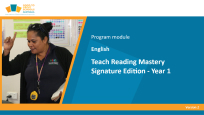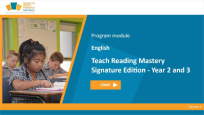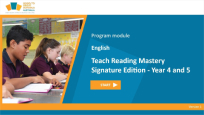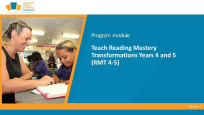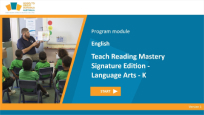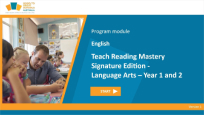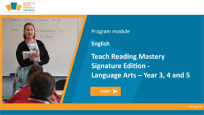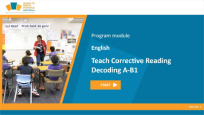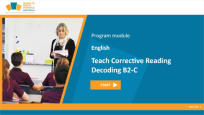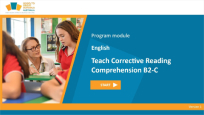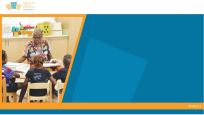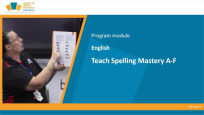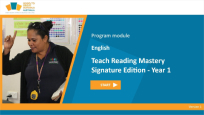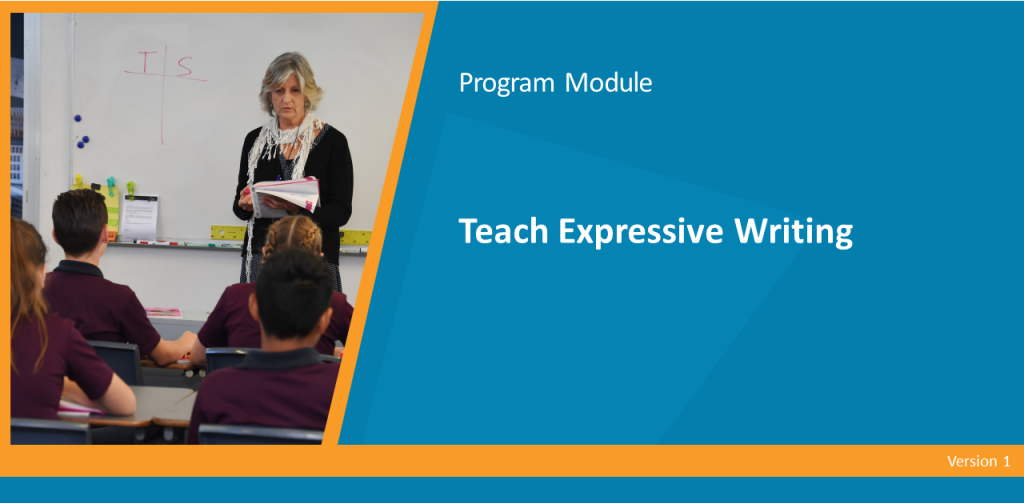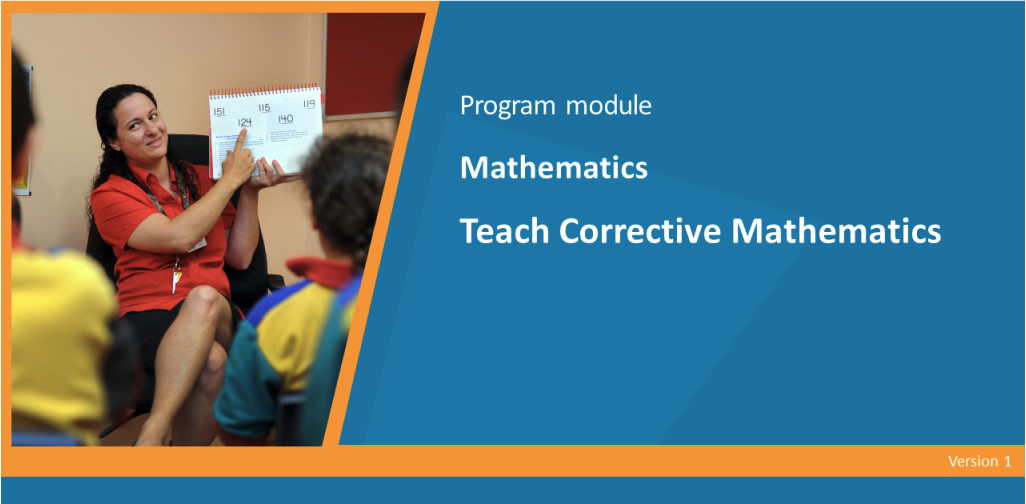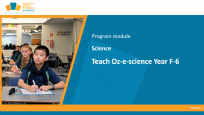Program Modules
A range of specialised evidence-based modules that cover the knowledge, skills and practice of program specific requirements. Modules enable participants to learn the programs and confidently apply what they learn in their role.
Share this page:
Modules
Overview
Other Modules
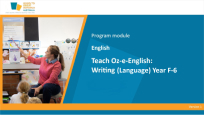
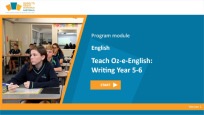
English
Teach Oz-e-English: Writing (Language) Year F–6
TEST
Teach Oz-e-English: Writing (Narrative, Civics, Economics & Business, History) Year 5–6
Teach Reading Mastery Signature Edition – K
Overview
In this module, participants will learn how to teach Reading Mastery Signature Edition K. The instructional design approach of RMSE K is Direct Instruction, which is designed for students to master the basics of beginning reading.
RMSE K is appropriate for students who are placed into RMSE K according to the program placement test. On completion, participants will know how to present RMSE K lessons, as well as how to engage students using a system based on positive motivation.
Leaders who have completed Learn Effective Teaching Essentials, Deliver Direct Instruction and Deliver Effective Teaching Modules will be able to support teaching teams in delivering the programs.
Teachers and teaching assistants can implement the techniques and practices, which include prereading exercises, work with symbol identification, rhyming, blending and comprehension.
Learning Intents
- Use instructional program scope and sequence charts to set learning goals that provide scaffolding and incremental challenges for students appropriate to their ability and goals (3.1.01).
- Implement lesson sequences with fidelity using knowledge of student learning, content and effective teaching strategies (3.1.02).
- Select and implement a variety of effective teaching strategies. Participate in program practice sessions to master teaching strategies (3.1.03).
- Demonstrate knowledge of effective teaching resources that are aligned with the core programs and further engage students in their learning (3.1.04 ).
- Incorporate feedback based on observations to Implement and improve a range of verbal and non-verbal communication strategies to support student engagement during small-group instruction (3.1.05).
- Implement re-teaching or skipping of direct instruction lessons, based on group mastery data, and in collaboration with Instruction Coach (3.1.08).
- Review direct instruction student mastery data daily to ensure groups stay at mastery.
- Implement lesson sequences with fidelity, maintaining student engagement and promoting learning (3.1.09).
- Review student work daily to ensure all students are at mastery.
- Implement effective teaching techniques to develop problem-solving skills in students (3.1.10).
- Demonstrate knowledge of effective teaching strategies and practices (3.2.01).
- Understand the underlying organisational principles of mastery learning programs (3.2.02).
- Use curriculum, assessment and reporting knowledge to collect student mastery data for analysis during problem-solving sessions (3.2.03).
- Know and understand effective teaching strategies for developing strong literacy and numeracy skills for all students (3.2.05).
- Implement all parts of direct and explicit instruction lessons (3.2.07).
- Plan group instruction based on mastery data and program guidelines (3.2.08).
- Implement direct and explicit instruction lessons with fidelity.
- Understand how to group students and maximise instructional time to manage classroom activities (3.4.02 ).
- Apply classroom practices across all activities by setting clear behavioural expectations and facilitating routines, orderly transitions and bell-to-bell teaching.
- Demonstrate knowledge of effective instructional behaviour strategies. Use evidence-based practices to support positive behaviour (3.4.04).
- Demonstrate understanding of how to use feedback during the implementation of Effective Instruction curricula as well as in-program mastery tests to assess student learning and make program decisions (3.6.01 ).
- Demonstrate an understanding of the purpose of providing timely and appropriate feedback to students about their learning during instruction and independent work by using appropriate corrective feedback and effective teaching procedures for diagnosis and remediation of curriculum-related skills (3.6.02).
- Demonstrate understanding of objective assessment anchored to the implementation of effective teaching curricula and its application to support consistent and comparable judgements of student learning (3.6.03).
- Demonstrate the capacity to interpret student assessment data from informal in-program assessments and related independent progress monitoring to evaluate student learning and modify teaching practice (3.6.04).
- Understand the importance of keeping accurate and reliable records of student achievement (3.6.05).
- Plan instructional time to implement mastery tests as indicated in the program (3.6.06).
- Implement in-program and out-of-program assessments to evaluate student mastery levels.
- Review mastery test data to determine individual and group mastery.
Prerequisite
- Learn Effective Teaching Essentials
- Deliver Direct Instruction
Duration
- 12 lessons
Assessment
Assessment has one stage:
- Test: Knowledge and skills taught in the lessons.
Certification
Participants are eligible for certification based on attendance and completion of assessment requirements for each module.
- Certificate of Completion: Complete online training and knowledge and skills tests.
Teach Reading Mastery Signature Edition – 1 (RMSE 1)
Overview
In this module, participants learn how to teach Reading Mastery Signature Edition 1.
The instructional design approach of RMSE 1 is Direct Instruction, which is designed for students who have basic decoding and comprehension skills. RMSE 1 is appropriate for students who completed Reading Mastery Signature Edition K are placed into RMSE 1 according to the program placement test.
On completion, participants know how to present RMSE 1 lessons, as well as how to engage students using a system based on positive motivation. Leaders who have completed Learn Effective Teaching Essentials, Deliver Direct Instruction and Deliver Effective Teaching Modules will be able to support teaching teams in delivering the programs. Teachers and teaching assistants can implement the techniques and practices, which include explicit phonics, decoding, vocabulary, story reading, comprehension and spelling activities.
Learning Intents
- Use instructional program scope and sequence charts to set learning goals that provide scaffolding and incremental challenges for students appropriate to their ability and goals (3.1.01).
- Implement lesson sequences with fidelity using knowledge of student learning, content and effective teaching strategies (3.1.02).
- Select and implement a variety of effective teaching strategies. Participate in program practice sessions to master teaching strategies (3.1.03).
- Demonstrate knowledge of effective teaching resources that are aligned with the core programs and further engage students in their learning (3.1.04).
- Incorporate feedback based on observations to implement and improve a range of verbal and non-verbal communication strategies to support student engagement during small-group instruction (3.1.05).
- Implement reteaching or skipping of direct instruction lessons based on group mastery data and in collaboration with Instruction Coach. Review direct instruction student mastery data daily to ensure groups stay at mastery (3.1.08).
- Implement lesson sequences with fidelity, maintain student engagement and promote learning. Review student work daily to ensure all students are at mastery (3.1.09).
- Implement effective teaching techniques to develop problem-solving skills in students (3.1.10).
- Demonstrate knowledge of effective teaching strategies and practices (3.2.01).
- Understand the underlying organisational principles of mastery learning programs (3.2.02).
- Use curriculum, assessment and reporting knowledge to collect student mastery data for analysis during problem-solving sessions (3.2.03).
- Know and understand effective teaching strategies for developing strong literacy and numeracy skills for all students (3.2.05).
- Implement all parts of direct and explicit instruction lessons (3.2.07).
- Plan group instruction based on mastery data and program guidelines. Implement direct and explicit instruction lessons with fidelity (3.2.08).
- Understand how to group students and maximise instructional time to manage classroom activities. Apply classroom practices across all activities by setting clear behavioural expectations, and facilitating routines, orderly transitions and bell-to-bell teaching (3.4.02).
- Demonstrate knowledge of effective instructional behaviour strategies. Use evidence-based practices to support positive behaviour (3.4.03).
- Demonstrate understanding of how to use feedback during the Implementation of Effective Instruction curricula as well as in-program mastery tests to assess student learning program decisions (3.6.01).
- Demonstrate an understanding of the purpose of providing timely and appropriate feedback to students about their learning during instruction and independent work by using appropriate corrective feedback and effective teaching procedures for diagnosis and remediation of curriculum-related skills (3.6.02).
- Demonstrate understanding of objective assessment anchored to the implementation of effective teaching curricula and its application to support consistent and comparable judgements of student learning (3.6.03).
- Demonstrate the capacity to interpret student assessment data from informal in-program assessments and related independent progress monitoring to evaluate student learning and modify teaching practice (3.6.04).
- Understand the importance of keeping accurate and reliable records of student achievement (3.6.05).
- Plan instructional time to implement mastery tests as indicated in the program. implement in-program and out-of-program assessments to evaluate student mastery levels. Review mastery test data to determine individual and group mastery (3.6.06).
Prerequisite
- Learn Effective Teaching Essentials
- Deliver Direct Instruction
Duration
- 12 lessons
Assessment
Assessment has one stage:
- Test: Knowledge and skills taught in the lessons.
Certification
Participants are eligible for certification based on attendance and completion of assessment requirements for each module.
- Certificate of Completion: Complete online training and knowledge and skills tests.
Teach Reading Mastery Signature Edition – 2 and 3
Overview
Reading Mastery Signature Edition 2–3 is a professional learning module for teachers and teaching assistants. In this module, participants will understand the rationale for RMSE 2–3 and how RMSE 2–3 fits into Reading Mastery Signature Edition Reading programs. They will also learn how to teach all lesson parts, how to correct specific errors, how to conduct mastery tests, how to record assessment data, and how to monitor and correct independent work in RMSE 2–3.
Learning Intents
- Use instructional program scope and sequence charts to set learning goals that provide scaffolding and incremental challenges for students appropriate to their ability and goals (3.1.01).
- Implement lesson sequences with fidelity using knowledge of student learning, content and effective teaching strategies (3.1.02).
- Select and implement a variety of effective teaching strategies. Participate in program practice sessions to master teaching strategies (3.1.03).
- Demonstrate knowledge of effective teaching resources that are aligned with the core programs and further engage students in their learning (3.1.04).
- Incorporate feedback based on observations to implement and improve a range of verbal and non-verbal communication strategies to support student engagement during small-group instruction (3.1.05).
- Implement reteaching or skipping of direct instruction lessons based on group mastery data and in collaboration with Instruction Coach. Review direct instruction student mastery data daily to ensure groups stay at mastery (3.1.08).
- Implement lesson sequences with fidelity, maintain student engagement and promote learning. Review student work daily to ensure all students are at mastery (3.1.09).
- Implement effective teaching techniques to develop problem-solving skills in students (3.1.10).
- Demonstrate knowledge of effective teaching strategies and practices (3.2.01).
- Understand the underlying organisational principles of mastery learning programs (3.2.02).
- Use curriculum, assessment and reporting knowledge to collect student mastery data for analysis during problem-solving sessions (3.2.03).
- Know and understand effective teaching strategies for developing strong literacy and numeracy skills for all students (3.2.05).
- Implement all parts of direct and explicit instruction lessons (3.2.07).
- Plan group instruction based on mastery data and program guidelines. Implement direct and explicit instruction lessons with fidelity (3.2.08).
- Understand how to group students and maximise instructional time to manage classroom activities. Apply classroom practices across all activities by setting clear behavioural expectations, and facilitating routines, orderly transitions and bell-to-bell teaching (3.4.02).
- Demonstrate knowledge of effective instructional behaviour strategies. Use evidence-based practices to support positive behaviour (3.4.03).
- Demonstrate understanding of how to use feedback during the implementation of Effective Instruction curricula as well as in-program mastery tests to assess student learning program decisions (3.6.01).
- Demonstrate an understanding of the purpose of providing timely and appropriate feedback to students about their learning during instruction and independent work by using appropriate corrective feedback and effective teaching procedures for diagnosis and remediation of curriculum-related skills (3.6.02).
- Demonstrate understanding of objective assessment anchored to the implementation of effective teaching curricula and its application to support consistent and comparable judgements of student learning (3.6.03).
- Demonstrate the capacity to interpret student assessment data from informal in-program assessments and related independent progress monitoring to evaluate student learning and modify teaching practice (3.6.04).
- Understand the importance of keeping accurate and reliable records of student achievement (3.6.05).
- Plan instructional time to implement mastery tests as indicated in the program. implement in-program and out-of-program assessments to evaluate student mastery levels. Review mastery test data to determine individual and group mastery (3.6.06).
Prerequisite
- Learn Effective Teaching Essentials
- Deliver Direct Instruction
Duration
- 12 lessons
Assessment
Assessment has one stage:
- Test: Knowledge and skills taught in the lessons.
Certification
Participants are eligible for certification based on attendance and completion of assessment requirements for each module.
- Certificate of Completion: Complete online training and knowledge and skills tests.
Teach Reading Mastery Signature Edition – 4 and 5
Overview
Reading Mastery Signature Edition 4–5 is a professional learning module for teachers and teaching assistants. In this module, participants will understand the rationale for RMSE 4–5 and how RMSE 4–5 fits into Reading Mastery Signature Edition Reading programs. They will also understand critical teaching points, how to correct specific errors, how to conduct mastery tests, how to record assessment data and how to monitor and correct independent work in RMSE 4–5.
Learning Intents
- Use instructional program scope and sequence charts to set learning goals that provide scaffolding and incremental challenges for students appropriate to their ability and goals (3.1.01).
- Implement lesson sequences with fidelity using knowledge of student learning, content and effective teaching strategies (3.1.02).
- Select and implement a variety of effective teaching strategies. Participate in program practice sessions to master teaching strategies (3.1.03).
- Demonstrate knowledge of effective teaching resources that are aligned with the core programs and further engage students in their learning (3.1.04).
- Incorporate feedback based on observations to implement and improve a range of verbal and non-verbal communication strategies to support student engagement during small-group instruction (3.1.05).
- Implement re-teaching or skipping of direct instruction lessons based on group mastery data and in collaboration with the instruction coach. Review direct instruction student mastery data daily to ensure groups stay at mastery (3.1.08).
- Implement lesson sequences with fidelity, maintaining student engagement and promoting learning. Review student work daily to ensure all students are at mastery (3.1.09).
- Implement effective teaching techniques to develop problem-solving skills in students (3.1.10).
- Demonstrate knowledge of effective teaching strategies and practices (3.2.01).
- Understand the underlying organisational principles of mastery learning programs (3.2.02).
- Use Curriculum, assessment and reporting knowledge to collect student mastery data for analysis during problem-solving sessions (3.2.03).
- Know and understand effective teaching strategies for developing strong literacy and numeracy skills for all students (3.2.05).
- Implement all parts of direct and explicit instruction lessons (3.2.07).
- Plan group instruction based on mastery data and program guidelines. Implement direct and explicit instruction lessons with fidelity (3.2.08).
- Understand how to group students and maximise instructional time to manage classroom activities. Apply classroom practices across all activities by setting clear behavioural expectations and facilitating routines, orderly transitions and bell-to-bell teaching (3.4.02).
- Demonstrate knowledge of effective instructional behaviour strategies. Use evidence-based practices to support positive behaviour (3.4.03).
- Demonstrate understanding of how to use feedback during the implementation of Effective Instruction curricula as well as in-program mastery tests to assess student learning program decisions (3.6.01).
- Demonstrate an understanding of the purpose of providing timely and appropriate feedback to students about their learning during instruction and independent work by using appropriate corrective feedback and effective teaching procedures for diagnosis and remediation of Curriculum-related skills (3.6.02).
- Demonstrate understanding of objective assessment anchored to the implementation of effective teaching curricula and its application to support consistent and comparable judgements of student learning (3.6.03).
- Demonstrate the capacity to interpret student assessment data from informal in-program assessments and related independent progress monitoring to evaluate student learning and modify teaching practice (3.6.04).
- Understand the importance of keeping accurate and reliable records of student achievement (3.6.05).
- Plan instructional time to implement mastery tests as indicated in the program. Implement in-program and out-of-program assessments to evaluate student mastery levels. Review mastery test data to determine individual and group mastery (3.6.06).
Prerequisite
-
- Learn Effective Teaching Essentials
- Deliver Direct Instruction
Duration
-
- 12 lessons
Assessment
Assessment has one stage:
- Test: Knowledge and skills taught in the lessons.
Certification
Participants are eligible for certification based on attendance and completion of assessment requirements for each module.
- Certificate of Completion: Complete online training and knowledge and skills tests.
Teach Reading Mastery Transformations – 4 and 5
Teach Reading Mastery Signature Edition Language Arts K
Overview
In this module, participants learn how to teach Reading Mastery Signature Edition Language Arts K.
The instructional design approach of RMSE LA K is direct instruction, designed for students who need basic language instruction. RMSE LA K is appropriate for students who are placed into RMSE LA K according to the program placement test. On completion, participants know how to present RMSE LA K lessons, as well as how to engage students using a system based on positive motivation. Leaders who have completed Learn Effective Teaching Essentials, Deliver Direct Instruction and Deliver Effective Teaching modules will be able to support teaching teams in delivering the programs. Teachers and teaching assistants can implement the techniques and practices, which include sequenced lessons providing students with practice in the language concepts and skills needed to succeed in school.
Learning Intents
- Use instructional program scope and sequence charts to set learning goals that provide scaffolding and incremental challenges for students appropriate to their ability and goals (3.1.01).
- Implement lesson sequences with fidelity using knowledge of student learning, content and effective teaching strategies (3.1.02).
- Select and implement a variety of effective teaching strategies. Participate in program practice sessions to master teaching strategies (3.1.03).
- Demonstrate knowledge of effective teaching resources that are aligned with the core programs and further engage students in their learning (3.1.04).
- Incorporate feedback based on observations to implement and improve a range of verbal and non-verbal communication strategies to support student engagement during small-group instruction (3.1.05).
- Implement re-teaching or skipping of direct instruction lessons, based on group mastery data, and in collaboration with instruction coach. Review direct instruction student mastery data daily to ensure groups stay at mastery (3.1.08).
- Implement lesson sequences with fidelity, maintaining student engagement and promoting learning. Review student work daily to ensure all students are at mastery (3.1.09).
- Implement effective teaching techniques to develop problem-solving skills in students (3.1.10).
- Demonstrate knowledge of effective teaching strategies and practices (3.2.01).
- Understand the underlying organisational principles of mastery learning programs (3.2.02).
- Use Curriculum, assessment and reporting knowledge to collect student mastery data for analysis during problem-solving sessions (3.2.03).
- Know and understand effective teaching strategies for developing strong literacy and numeracy skills for all students (3.2.05).
- Implement all parts of direct and explicit instruction lessons (3.2.07).
- Plan group instruction based on mastery data and program guidelines. Implement direct and explicit instruction lessons with fidelity (3.2.08).
- Understand how to group students and maximise instructional time to manage classroom activities. Apply classroom practices across all activities by setting clear behavioural expectations and facilitating routines, orderly transitions and bell-to-bell teaching (3.4.02).
- Demonstrate knowledge of effective instructional behaviour strategies. Use evidence-based practices to support positive behaviour (3.4.03).
- Demonstrate understanding of how to use feedback during the implementation of Effective Instruction curricula as well as in-program mastery tests to assess student learning program decisions (3.6.01).
- Demonstrate an understanding of the purpose of providing timely and appropriate feedback to students about their learning during instruction and independent work by using appropriate corrective feedback and effective teaching procedures for diagnosis and remediation of Curriculum-related skills (3.6.02).
- Demonstrate understanding of objective assessment anchored to the implementation of effective teaching curricula and its application to support consistent and comparable judgements of student learning (3.6.03).
- Demonstrate the capacity to interpret student assessment data from informal in-program assessments and related independent progress monitoring to evaluate student learning and modify teaching practice (3.6.04).
- Understand the importance of keeping accurate and reliable records of student achievement (3.6.05).
- Plan instructional time to implement mastery tests as indicated in the program. Implement in-program and out-of-program assessments to evaluate student mastery levels. Review mastery test data to determine individual and group mastery (3.6.06).
Prerequisite
-
-
Learn Effective Teaching Essentials
-
Deliver Direct Instruction
-
Duration
- 12 lessons
Assessment
Assessment has one stage:
-
- Test: Knowledge and skills taught in the lessons.
Certification
Participants are eligible for certification based on attendance and completion of assessment requirements for each module.
-
- Certificate of Completion: Complete online training and knowledge and skills tests.
Teach Reading Mastery Signature Edition – Language Arts – 1 and 2
Teach Reading Mastery Signature Edition Language Arts 3 – 5
Teach Spelling Mastery K–5
Overview
Spelling Mastery is a professional learning module for teachers and teaching assistants. In this module, participants will understand the core instructional strategies for implementing Spelling Mastery accurately in order to accomplish basic direct instruction teaching techniques. They will also learn different ways to gather data and how to use data to inform instruction.
Learning Intents
- Use instructional program scope and sequence charts to set learning goals that provide scaffolding and incremental challenges for students appropriate to their ability and goals (3.1.01).
- Implement lesson sequences with fidelity using knowledge of student learning, content and effective teaching strategies (3.1.02).
- Select and implement a variety of effective teaching strategies. Participate in program practice sessions to master teaching strategies (3.1.03).
- Demonstrate knowledge of effective teaching resources that are aligned with the core programs and further engage students in their learning (3.1.04).
- Incorporate feedback based on observations to implement and improve a range of verbal and non-verbal communication strategies to support student engagement during small-group instruction (3.1.05).
- Implement re-teaching or skipping of direct instruction lessons, based on group mastery data, and in collaboration with instruction coach. Review direct instruction student mastery data daily to ensure groups stay at mastery (3.1.08).
- Implement lesson sequences with fidelity, maintaining student engagement and promoting learning. Review student work daily to ensure all students are at mastery (3.1.09).
- Implement effective teaching techniques to develop problem-solving skills in students (3.1.10).
- Demonstrate knowledge of effective teaching strategies and practices (3.2.01).
- Understand the underlying organisational principles of mastery learning programs (3.2.02).
- Use Curriculum, assessment and reporting knowledge to collect student mastery data for analysis during problem-solving sessions (3.2.03).
- Know and understand effective teaching strategies for developing strong literacy and numeracy skills for all students (3.2.05).
- Implement all parts of direct and explicit instruction lessons (3.2.07).
- Plan group instruction based on mastery data and program guidelines. Implement direct and explicit instruction lessons with fidelity (3.2.08).
- Understand how to group students and maximise instructional time to manage classroom activities. Apply classroom practices across all activities by setting clear behavioural expectations and facilitating routines, orderly transitions and bell-to-bell teaching (3.4.02).
- Demonstrate knowledge of effective instructional behaviour strategies. Use evidence-based practices to support positive behaviour (3.4.03).
- Demonstrate understanding of how to use feedback during the implementation of Effective Instruction curricula as well as in-program mastery tests to assess student learning program decisions (3.6.01).
- Demonstrate an understanding of the purpose of providing timely and appropriate feedback to students about their learning during instruction and independent work by using appropriate corrective feedback and effective teaching procedures for diagnosis and remediation of Curriculum-related skills (3.6.02).
- Demonstrate understanding of objective assessment anchored to the implementation of effective teaching curricula and its application to support consistent and comparable judgements of student learning (3.6.03).
- Demonstrate the capacity to interpret student assessment data from informal in-program assessments and related independent progress monitoring to evaluate student learning and modify teaching practice (3.6.04).
- Understand the importance of keeping accurate and reliable records of student achievement (3.6.05).
- Plan instructional time to implement mastery tests as indicated in the program. Implement in-program and out-of-program assessments to evaluate student mastery levels. Review mastery test data to determine individual and group mastery (3.6.06).
Prerequisite
- Learn Effective Teaching Essentials
- Deliver Direct Instruction
Duration
- 12 lessons
Assessment
Assessment has one stage:
- Test: Knowledge and skills taught in the lessons.
Certification
Participants are eligible for certification based on attendance and completion of assessment requirements for each module.
- Certificate of Completion: Complete online training and knowledge and skills tests.
Teach Corrective Reading Comprehension A–B1
Teach Expressive Writing
Overview
Teach Expressive Writing is a professional learning module for teachers and teaching assistants. In this module, participants will understand the core components of Teach Expressive Writing and the techniques needed for teaching Expressive Writing. They will also learn how to conduct mastery tests and record assessment data.
Learning Intents
Context Setting
- Understand the direct instruction content and the rationale behind program sequencing (3.1.02).
- Understand the importance of placement tests in placing students in programs and levels (3.2.02).
- Demonstrate effective use of instructional time by managing the classroom (3.4.02).
Preparing to Teach
- Demonstrate techniques that engage students and deliver lesson components to fidelity (3.1.02).
- Understand how to extract student mastery data from curriculum, assessment, and reporting (3.1.03).
- Demonstrate the ability to teach lessons using direct and explicit instruction teaching techniques (3.2.01).
- Implement all parts of direct and explicit instruction lessons (3.2.07).
Corrections
- Communicate corrective feedback to students during instruction and independent learning (3.6.01).
- Understand the purpose of providing timely and appropriate feedback to students about their learning and behavior (3.6.02).
- Demonstrate appropriate corrective feedback and effective teaching procedures for diagnosis and remediation of academic and behavioral errors (3.6.02).
Independent Work – Workbook
- Demonstrate direct and explicit instruction concepts in developing independent work that aligns with the program being taught (3.1.04).
Mastery Tests
- Plan group instruction based on mastery data and program guidelines (3.2.08).
- Demonstrate remedies and re-testing as indicated in direct instruction following mastery tests and/or student checkouts and use correction procedures when students make errors (3.6.01).
- Implement in-program and out-of-program assessments to evaluate student mastery levels (3.6.06).
- Review mastery test data to determine individual and group mastery (3.6.06).
Motivating Students
- Demonstrate a range of verbal and non-verbal communication strategies to support student engagement in small and large group instruction (3.1.05).
- Apply classroom practices across all activities by setting clear behavioral expectations and facilitating routines, orderly transitions, and bell-to-bell teaching (3.4.02).
Prerequisite
- Learn Effective Teaching Essentials
- Deliver Direct Instruction
Duration
- 10 lessons
Assessment
Assessment has two stages:
- Test: Knowledge and skills taught in the lessons.
- Certification
Certification
Participants are eligible for certification based on the completion of all activities and tests in the module.
- Certificate of Completion: Complete online training and knowledge and skills tests.
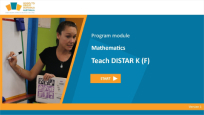
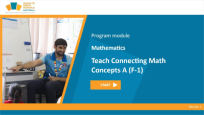
Maths
Teach DISTAR Arithmetic 1 (F)
Teach Connecting Math Concepts A (F–1)
Overview
CMC – A is a professional learning module for teachers and teaching assistants. In this module, participants will understand the rationale for using CMC-A, how to teach exercises, how and when to use the accompanying correction procedures and how to conduct workbook exercises and work checks. They will also learn how to conduct mastery tests, how to record assessment data and how to motivate students.
Learning Intents
- Use instructional program scope and sequence charts to set learning goals that provide scaffolding and incremental challenges for students appropriate to their ability and goals (3.1.01).
- Implement lesson sequences with fidelity using knowledge of student learning, content and effective teaching strategies (3.1.02).
- Select and implement a variety of effective teaching strategies. Participate in program practice sessions to master teaching strategies (3.1.03).
- Demonstrate knowledge of effective teaching resources that are aligned with the core programs and further engage students in their learning (3.1.04).
- Incorporate feedback based on observations to implement and improve a range of verbal and non-verbal communication strategies to support student engagement during small-group instruction (3.1.05).
- Implement re-teaching or skipping of direct instruction lessons, based on group mastery data, and in collaboration with instruction coach. Review direct instruction student mastery data daily to ensure groups stay at mastery (3.1.08).
- Implement lesson sequences with fidelity, maintaining student engagement and promoting learning. Review student work daily to ensure all students are at mastery (3.1.09).
- Implement effective teaching techniques to develop problem-solving skills in students (3.1.10).
- Demonstrate knowledge of effective teaching strategies and practices (3.2.01).
- Understand the underlying organisational principles of mastery learning programs (3.2.02).
- Use curriculum, assessment and reporting knowledge to collect student mastery data for analysis during problem-solving sessions (3.2.03).
- Know and understand effective teaching strategies for developing strong literacy and numeracy skills for all students (3.2.05).
- Implement all parts of direct and explicit instruction lessons (3.2.07).
- Plan group instruction based on mastery data and program guidelines. Implement direct and explicit instruction lessons with fidelity (3.2.08).
- Understand how to group students and maximise instructional time to manage classroom activities. Apply classroom practices across all activities by setting clear behavioural expectations and facilitating routines, orderly transitions and bell-to-bell teaching (3.4.02).
- Demonstrate knowledge of effective instructional behaviour strategies. Use evidence-based practices to support positive behaviour (3.4.03).
- Demonstrate understanding of how to use feedback during the implementation of Effective Instruction curricula as well as in-program Mastery Tests to assess student learning program decisions (3.6.01).
- Demonstrate an understanding of the purpose of providing timely and appropriate feedback to students about their learning during instruction and independent work by using appropriate corrective feedback and effective teaching procedures for diagnosis and remediation of curriculum-related skills (3.6.02).
- Demonstrate understanding of objective assessment anchored to the implementation of effective teaching curricula and its application to support consistent and comparable judgements of student learning (3.6.03).
- Demonstrate the capacity to interpret student assessment data from informal in-program assessments and related independent progress monitoring to evaluate student learning and modify teaching practice (3.6.04).
- Understand the importance of keeping accurate and reliable records of student achievement (3.6.05).
- Plan instructional time to implement mastery tests as indicated in the program. Implement in-program and out-of-program assessments to evaluate student mastery levels. Review mastery test data to determine individual and group mastery (3.6.06).
Prerequisite
- Learn Effective Teaching Essentials
- Deliver Direct Instruction
Duration
- 12 lessons
Assessment
- Test: Knowledge and skills taught in the lessons.
Certification
Participants are eligible for certification based on attendance and completion of assessment requirements for each module.
- Certificate of Completion: Complete online training and knowledge and skills tests.
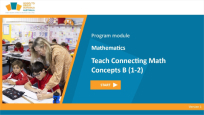
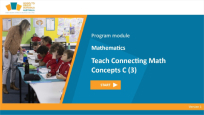
Teach Connecting Math Concepts B (1–2)
CMC – B is a professional learning module for teachers and teaching assistants. In this module, participants will understand the rationale for using CMC-B and learn how Oz-e-maths connects to Connecting Math Concepts. They will also understand the progression of the eight learning tracks of Connecting Math Concepts Level B, the potential problems and learn how to correct specific mistakes.
Learning Intents
- Use instructional program scope and sequence charts to set learning goals that provide scaffolding and incremental challenges for students appropriate to their ability and goals (3.1.01).
- Implement lesson sequences with fidelity using knowledge of student learning, content and effective teaching strategies (3.1.02).
- Select and implement a variety of effective teaching strategies. Participate in program practice sessions to master teaching strategies (3.1.03).
- Demonstrate knowledge of effective teaching resources that are aligned with the core programs and further engage students in their learning (3.1.04).
- Incorporate feedback based on observations to implement and improve a range of verbal and non-verbal communication strategies to support student engagement during small-group instruction (3.1.05).
- Implement re-teaching or skipping of direct instruction lessons, based on group mastery data, and in collaboration with instruction coach. Review direct instruction student mastery data daily to ensure groups stay at mastery (3.1.08).
- Implement lesson sequences with fidelity, maintaining student engagement and promoting learning. Review student work daily to ensure all students are at mastery (3.1.09).
- Implement effective teaching techniques to develop problem-solving skills in students (3.1.10).
- Demonstrate knowledge of effective teaching strategies and practices (3.2.01).
- Understand the underlying organisational principles of mastery learning programs (3.2.02).
- Use curriculum, assessment and reporting knowledge to collect student mastery data for analysis during problem-solving sessions (3.2.03).
- Know and understand effective teaching strategies for developing strong literacy and numeracy skills for all students (3.2.05).
- Implement all parts of direct and explicit instruction lessons (3.2.07).
- Plan group instruction based on mastery data and program guidelines. Implement direct and explicit instruction lessons with fidelity (3.2.08).
- Understand how to group students and maximise instructional time to manage classroom activities. Apply classroom practices across all activities by setting clear behavioural expectations and facilitating routines, orderly transitions and bell-to-bell teaching (3.4.02).
- Demonstrate knowledge of effective instructional behaviour strategies. Use evidence-based practices to support positive behaviour (3.4.03).
- Demonstrate understanding of how to use feedback during the implementation of Effective Instruction curricula as well as in-program Mastery Tests to assess student learning program decisions (3.6.01).
- Demonstrate an understanding of the purpose of providing timely and appropriate feedback to students about their learning during instruction and independent work by using appropriate corrective feedback and effective teaching procedures for diagnosis and remediation of curriculum-related skills (3.6.02).
- Demonstrate understanding of objective assessment anchored to the implementation of effective teaching curricula and its application to support consistent and comparable judgements of student learning (3.6.03).
- Demonstrate the capacity to interpret student assessment data from informal in-program assessments and related independent progress monitoring to evaluate student learning and modify teaching practice (3.6.04).
- Understand the importance of keeping accurate and reliable records of student achievement (3.6.05).
- Plan instructional time to implement mastery tests as indicated in the program. Implement in-program and out-of-program assessments to evaluate student mastery levels. Review mastery test data to determine individual and group mastery (3.6.06).
Prerequisite
- Learn Effective Teaching Essentials
- Deliver Direct Instruction
Duration
- 12 lessons
Assessment
- Test: Knowledge and skills taught in the lessons.
Certification
Participants are eligible for certification based on attendance and completion of assessment requirements for each module.
- Certificate of Completion: Complete online training and knowledge and skills tests.
Teach Connecting Math Concepts C (3)
Overview
CMC – C is a professional learning module for teachers and teaching assistants. In this module, participants will understand and apply techniques needed for teaching Connecting Math Concepts Comprehensive Edition Level C. They will also learn how to conduct mastery tests and record assessment data.
Learning Intents
- Use instructional program scope and sequence charts to set learning goals that provide scaffolding and incremental challenges for students appropriate to their ability and goals (3.1.01).
- Implement lesson sequences with fidelity using knowledge of student learning, content and effective teaching strategies (3.1.02).
- Select and implement a variety of effective teaching strategies. Participate in program practice sessions to master teaching strategies (3.1.03).
- Demonstrate knowledge of effective teaching resources that are aligned with the core programs and further engage students in their learning (3.1.04).
- Incorporate feedback based on observations to implement and improve a range of verbal and non-verbal communication strategies to support student engagement during small-group instruction (3.1.05).
- Implement re-teaching or skipping of direct instruction lessons, based on group mastery data, and in collaboration with instruction coach. Review direct instruction student mastery data daily to ensure groups stay at mastery (3.1.08).
- Implement lesson sequences with fidelity, maintaining student engagement and promoting learning. Review student work daily to ensure all students are at mastery (3.1.09).
- Implement effective teaching techniques to develop problem-solving skills in students (3.1.10).
- Demonstrate knowledge of effective teaching strategies and practices (3.2.01).
- Understand the underlying organisational principles of mastery learning programs (3.2.02).
- Use curriculum, assessment and reporting knowledge to collect student mastery data for analysis during problem-solving sessions (3.2.03).
- Know and understand effective teaching strategies for developing strong literacy and numeracy skills for all students (3.2.05).
- Implement all parts of direct and explicit instruction lessons (3.2.07).
- Plan group instruction based on mastery data and program guidelines. Implement direct and explicit instruction lessons with fidelity (3.2.08).
- Understand how to group students and maximise instructional time to manage classroom activities. Apply classroom practices across all activities by setting clear behavioural expectations and facilitating routines, orderly transitions and bell-to-bell teaching (3.4.02).
- Demonstrate knowledge of effective instructional behaviour strategies. Use evidence-based practices to support positive behaviour (3.4.03).
- Demonstrate understanding of how to use feedback during the implementation of Effective Instruction curricula as well as in-program Mastery Tests to assess student learning program decisions (3.6.01).
- Demonstrate an understanding of the purpose of providing timely and appropriate feedback to students about their learning during instruction and independent work by using appropriate corrective feedback and effective teaching procedures for diagnosis and remediation of curriculum-related skills (3.6.02).
- Demonstrate understanding of objective assessment anchored to the implementation of effective teaching curricula and its application to support consistent and comparable judgements of student learning (3.6.03).
- Demonstrate the capacity to interpret student assessment data from informal in-program assessments and related independent progress monitoring to evaluate student learning and modify teaching practice (3.6.04).
- Understand the importance of keeping accurate and reliable records of student achievement (3.6.05).
- Plan instructional time to implement mastery tests as indicated in the program. Implement in-program and out-of-program assessments to evaluate student mastery levels. Review mastery test data to determine individual and group mastery (3.6.06).
Prerequisite
- Learn Effective Teaching Essentials
- Deliver Direct Instruction
Duration
- 12 lessons
Assessment
- Test: Knowledge and skills taught in the lessons.
Certification
Participants are eligible for certification based on attendance and completion of assessment requirements for each module.
- Certificate of Completion: Complete online training and knowledge and skills tests.
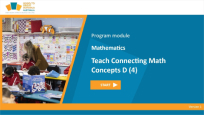
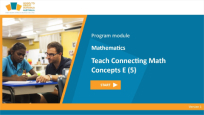
Teach Connecting Math Concepts D (4)
CMC – D is a professional learning module for teachers and teaching assistants. In this module, participants will understand and apply techniques needed for teaching Connecting Math Concepts Comprehensive Edition Level D. They will also learn how to conduct mastery tests and record assessment data.
Learning Intents
- Use instructional program scope and sequence charts to set learning goals that provide scaffolding and incremental challenges for students appropriate to their ability and goals (3.1.01).
- Implement lesson sequences with fidelity using knowledge of student learning, content and effective teaching strategies (3.1.02).
- Select and implement a variety of effective teaching strategies. Participate in program practice sessions to master teaching strategies (3.1.03).
- Demonstrate knowledge of effective teaching resources that are aligned with the core programs and further engage students in their learning (3.1.04).
- Incorporate feedback based on observations to implement and improve a range of verbal and non-verbal communication strategies to support student engagement during small-group instruction (3.1.05).
- Implement re-teaching or skipping of direct instruction lessons, based on group mastery data, and in collaboration with instruction coach. Review direct instruction student mastery data daily to ensure groups stay at mastery (3.1.08).
- Implement lesson sequences with fidelity, maintaining student engagement and promoting learning. Review student work daily to ensure all students are at mastery (3.1.09).
- Implement effective teaching techniques to develop problem-solving skills in students (3.1.10).
- Demonstrate knowledge of effective teaching strategies and practices (3.2.01).
- Understand the underlying organisational principles of mastery learning programs (3.2.02).
- Use curriculum, assessment and reporting knowledge to collect student mastery data for analysis during problem-solving sessions (3.2.03).
- Know and understand effective teaching strategies for developing strong literacy and numeracy skills for all students (3.2.05).
- Implement all parts of direct and explicit instruction lessons (3.2.07).
- Plan group instruction based on mastery data and program guidelines. Implement direct and explicit instruction lessons with fidelity (3.2.08).
- Understand how to group students and maximise instructional time to manage classroom activities. Apply classroom practices across all activities by setting clear behavioural expectations and facilitating routines, orderly transitions and bell-to-bell teaching (3.4.02).
- Demonstrate knowledge of effective instructional behaviour strategies. Use evidence-based practices to support positive behaviour (3.4.03).
- Demonstrate understanding of how to use feedback during the implementation of Effective Instruction curricula as well as in-program Mastery Tests to assess student learning program decisions (3.6.01).
- Demonstrate an understanding of the purpose of providing timely and appropriate feedback to students about their learning during instruction and independent work by using appropriate corrective feedback and effective teaching procedures for diagnosis and remediation of curriculum-related skills (3.6.02).
- Demonstrate understanding of objective assessment anchored to the implementation of effective teaching curricula and its application to support consistent and comparable judgements of student learning (3.6.03).
- Demonstrate the capacity to interpret student assessment data from informal in-program assessments and related independent progress monitoring to evaluate student learning and modify teaching practice (3.6.04).
- Understand the importance of keeping accurate and reliable records of student achievement (3.6.05).
- Plan instructional time to implement mastery tests as indicated in the program. Implement in-program and out-of-program assessments to evaluate student mastery levels. Review mastery test data to determine individual and group mastery (3.6.06).
Prerequisite
- Learn Effective Teaching Essentials
- Deliver Direct Instruction
Duration
- 12 lessons
Assessment
- Test: Knowledge and skills taught in the lessons.
Certification
Participants are eligible for certification based on attendance and completion of assessment requirements for each module.
- Certificate of Completion: Complete online training and knowledge and skills tests.
Teach Connecting Math Concepts E (5)
C MC – E is a professional learning module for teachers and teaching assistants. In this module, participants will understand the rationale for using CMC-E and learn how Oz-e-maths connects to Connecting Math Concepts. They will also understand the progression of the eight learning tracks of Connecting Math Concepts Level E, the potential problems, and learn how to correct specific mistakes.
Learning Intents
- Use instructional program scope and sequence charts to set learning goals that provide scaffolding and incremental challenges for students appropriate to their ability and goals (3.1.01).
- Implement lesson sequences with fidelity using knowledge of student learning, content and effective teaching strategies (3.1.02).
- Select and implement a variety of effective teaching strategies. Participate in program practice sessions to master teaching strategies (3.1.03).
- Demonstrate knowledge of effective teaching resources that are aligned with the core programs and further engage students in their learning (3.1.04).
- Incorporate feedback based on observations to implement and improve a range of verbal and non-verbal communication strategies to support student engagement during small-group instruction (3.1.05).
- Implement re-teaching or skipping of direct instruction lessons, based on group mastery data, and in collaboration with instruction coach. Review direct instruction student mastery data daily to ensure groups stay at mastery (3.1.08).
- Implement lesson sequences with fidelity, maintaining student engagement and promoting learning. Review student work daily to ensure all students are at mastery (3.1.09).
- Implement effective teaching techniques to develop problem-solving skills in students (3.1.10).
- Demonstrate knowledge of effective teaching strategies and practices (3.2.01).
- Understand the underlying organisational principles of mastery learning programs (3.2.02).
- Use curriculum, assessment and reporting knowledge to collect student mastery data for analysis during problem-solving sessions (3.2.03).
- Know and understand effective teaching strategies for developing strong literacy and numeracy skills for all students (3.2.05).
- Implement all parts of direct and explicit instruction lessons (3.2.07).
- Plan group instruction based on mastery data and program guidelines. Implement direct and explicit instruction lessons with fidelity (3.2.08).
- Understand how to group students and maximise instructional time to manage classroom activities. Apply classroom practices across all activities by setting clear behavioural expectations and facilitating routines, orderly transitions and bell-to-bell teaching (3.4.02).
- Demonstrate knowledge of effective instructional behaviour strategies. Use evidence-based practices to support positive behaviour (3.4.03).
- Demonstrate understanding of how to use feedback during the implementation of Effective Instruction curricula as well as in-program Mastery Tests to assess student learning program decisions (3.6.01).
- Demonstrate an understanding of the purpose of providing timely and appropriate feedback to students about their learning during instruction and independent work by using appropriate corrective feedback and effective teaching procedures for diagnosis and remediation of curriculum-related skills (3.6.02).
- Demonstrate understanding of objective assessment anchored to the implementation of effective teaching curricula and its application to support consistent and comparable judgements of student learning (3.6.03).
- Demonstrate the capacity to interpret student assessment data from informal in-program assessments and related independent progress monitoring to evaluate student learning and modify teaching practice (3.6.04).
- Understand the importance of keeping accurate and reliable records of student achievement (3.6.05).
- Plan instructional time to implement mastery tests as indicated in the program. Implement in-program and out-of-program assessments to evaluate student mastery levels. Review mastery test data to determine individual and group mastery (3.6.06).
Prerequisite
- Learn Effective Teaching Essentials
- Deliver Direct Instruction
Duration
- 12 lessons
Assessment
- Test: Knowledge and skills taught in the lessons.
Certification
Participants are eligible for certification based on attendance and completion of assessment requirements for each module.
- Certificate of Completion: Complete online training and knowledge and skills tests.
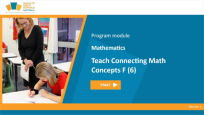
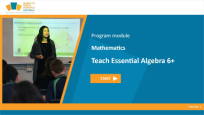
Teach Connecting Math Concepts F (6)
Overview
CMC – F is a professional learning module for teachers and teaching assistants. In this module, participants will understand the rationale for using CMC-F and learn how Oz-e-maths connects to Connecting Math Concepts. They will also understand the progression of the eight learning tracks of Connecting Math Concepts Level F, the potential problems, and learn how to correct specific mistakes.
Learning Intents
- Use instructional program scope and sequence charts to set learning goals that provide scaffolding and incremental challenges for students appropriate to their ability and goals (3.1.01).
- Implement lesson sequences with fidelity using knowledge of student learning, content and effective teaching strategies (3.1.02).
- Select and implement a variety of effective teaching strategies. Participate in program practice sessions to master teaching strategies (3.1.03).
- Demonstrate knowledge of effective teaching resources that are aligned with the core programs and further engage students in their learning (3.1.04).
- Incorporate feedback based on observations to implement and improve a range of verbal and non-verbal communication strategies to support student engagement during small-group instruction (3.1.05).
- Implement re-teaching or skipping of direct instruction lessons, based on group mastery data, and in collaboration with instruction coach. Review direct instruction student mastery data daily to ensure groups stay at mastery (3.1.08).
- Implement lesson sequences with fidelity, maintaining student engagement and promoting learning. Review student work daily to ensure all students are at mastery (3.1.09).
- Implement effective teaching techniques to develop problem-solving skills in students (3.1.10).
- Demonstrate knowledge of effective teaching strategies and practices (3.2.01).
- Understand the underlying organisational principles of mastery learning programs (3.2.02).
- Use curriculum, assessment and reporting knowledge to collect student mastery data for analysis during problem-solving sessions (3.2.03).
- Know and understand effective teaching strategies for developing strong literacy and numeracy skills for all students (3.2.05).
- Implement all parts of direct and explicit instruction lessons (3.2.07).
- Plan group instruction based on mastery data and program guidelines. Implement direct and explicit instruction lessons with fidelity (3.2.08).
- Understand how to group students and maximise instructional time to manage classroom activities. Apply classroom practices across all activities by setting clear behavioural expectations and facilitating routines, orderly transitions and bell-to-bell teaching (3.4.02).
- Demonstrate knowledge of effective instructional behaviour strategies. Use evidence-based practices to support positive behaviour (3.4.03).
- Demonstrate understanding of how to use feedback during the implementation of Effective Instruction curricula as well as in-program Mastery Tests to assess student learning program decisions (3.6.01).
- Demonstrate an understanding of the purpose of providing timely and appropriate feedback to students about their learning during instruction and independent work by using appropriate corrective feedback and effective teaching procedures for diagnosis and remediation of curriculum-related skills (3.6.02).
- Demonstrate understanding of objective assessment anchored to the implementation of effective teaching curricula and its application to support consistent and comparable judgements of student learning (3.6.03).
- Demonstrate the capacity to interpret student assessment data from informal in-program assessments and related independent progress monitoring to evaluate student learning and modify teaching practice (3.6.04).
- Understand the importance of keeping accurate and reliable records of student achievement (3.6.05).
- Plan instructional time to implement mastery tests as indicated in the program. Implement in-program and out-of-program assessments to evaluate student mastery levels. Review mastery test data to determine individual and group mastery (3.6.06).
Prerequisite
- Learn Effective Teaching Essentials
- Deliver Direct Instruction
Duration
- 12 lessons
Assessment
- Test: Knowledge and skills taught in the lessons.
Certification
Participants are eligible for certification based on attendance and completion of assessment requirements for each module.
- Certificate of Completion: Complete online training and knowledge and skills tests.
Teach Essential Algebra 6+
Teach Corrective Mathematics
Overview
Teach Corrective Mathematics is a professional learning module for teachers and teaching assistants. In this module, participants will understand the core components of Teach Corrective Mathematics and apply the techniques needed for teaching Corrective Mathematics. They will also learn how to conduct mastery tests and record assessment data.
Learning Intents
- Use instructional program scope and sequence charts to set learning goals that provide scaffolding and incremental challenges for students appropriate to their ability and goals (3.1.01).
- Implement lesson sequences with fidelity using knowledge of student learning, content and effective teaching strategies (3.1.02).
- Select and implement a variety of effective teaching strategies. Participate in program practice sessions to master teaching strategies (3.1.03).
- Demonstrate knowledge of effective teaching resources that are aligned with the core programs and further engage students in their learning (3.1.04).
- Incorporate feedback based on observations to implement and improve a range of verbal and non-verbal communication strategies to support student engagement during small-group instruction (3.1.05).
- Implement re-teaching or skipping of direct instruction lessons, based on group mastery data, and in collaboration with instruction coach. Review direct instruction student mastery data daily to ensure groups stay at mastery (3.1.08).
- Implement lesson sequences with fidelity, maintaining student engagement and promoting learning. Review student work daily to ensure all students are at mastery (3.1.09).
- Implement effective teaching techniques to develop problem-solving skills in students (3.1.10).
- Demonstrate knowledge of effective teaching strategies and practices (3.2.01).
- Understand the underlying organisational principles of mastery learning programs (3.2.02).
- Use curriculum, assessment and reporting knowledge to collect student mastery data for analysis during problem-solving sessions (3.2.03).
- Know and understand effective teaching strategies for developing strong literacy and numeracy skills for all students (3.2.05).
- Implement all parts of direct and explicit instruction lessons (3.2.07).
- Plan group instruction based on mastery data and program guidelines. Implement direct and explicit instruction lessons with fidelity (3.2.08).
- Understand how to group students and maximise instructional time to manage classroom activities. Apply classroom practices across all activities by setting clear behavioural expectations and facilitating routines, orderly transitions and bell-to-bell teaching (3.4.02).
- Demonstrate knowledge of effective instructional behaviour strategies. Use evidence-based practices to support positive behaviour (3.4.03).
- Demonstrate understanding of how to use feedback during the implementation of Effective Instruction curricula as well as in-program Mastery Tests to assess student learning program decisions (3.6.01).
- Demonstrate an understanding of the purpose of providing timely and appropriate feedback to students about their learning during instruction and independent work by using appropriate corrective feedback and effective teaching procedures for diagnosis and remediation of curriculum-related skills (3.6.02).
- Demonstrate understanding of objective assessment anchored to the implementation of effective teaching curricula and its application to support consistent and comparable judgements of student learning (3.6.03).
- Demonstrate the capacity to interpret student assessment data from informal in-program assessments and related independent progress monitoring to evaluate student learning and modify teaching practice (3.6.04).
- Understand the importance of keeping accurate and reliable records of student achievement (3.6.05).
- Plan instructional time to implement mastery tests as indicated in the program. Implement in-program and out-of-program assessments to evaluate student mastery levels. Review mastery test data to determine individual and group mastery (3.6.06).
Prerequisite
- Learn Effective Teaching Essentials
- Deliver Direct Instruction
Duration
- 10 lessons
Assessment
There are two stages of assessment:
- Test: Knowledge and skills taught in the lessons.
- Mastery Assessment: Delivery of the knowledge and skills learned in the lessons.
Certification
Participants are eligible for certification based on their attendance and completion of the assessment requirements for each module.
- Certificate of Completion: Complete the online training and knowledge and skills tests.
- Certificate of Mastery: Pass the knowledge and skills video mastery evaluation

Administer Direct Instruction
Administer Direct Instruction

Placement Tests
Placement Tests
Science
Teach Oz-e-Science Year F–6
Overview
This course aligns with the Oz-e-science curriculum program. Teachers and assistant teachers should complete this course before using the Oz-e-science program in the classroom. Oz-e-science is based on explicit, teacher-led instruction and scientific inquiry. The program has a heavy focus on science content knowledge involving exposure to examples, understanding the logical rules or principles underpinning the examples, and applying this understanding to novel examples. The program engages and teaches students in the practice of scientific inquiry. This involves learning about the scientific method and applying it to practical science research activities and simulations set out in the units. Oz-e-science teaches scientific inquiry according to the scientific method rather than using inquiry learning pedagogy. The learning pedagogy is explicit instruction.
Learning Intents
- Communicate learning goals to school leaders, colleagues, and parents. (3.1.01)
- Demonstrate techniques that engage students and deliver lesson components to fidelity. (3.1.02)
- Communicate to colleagues and classroom visitors basic direct and explicit instruction techniques and uses.(3.1.03)
- Understand components of effective teaching resources (such as the Teacher’s Guide) that align with core programs. (3.1.04)
- Demonstrate a range of verbal and non-verbal communication strategies to support student engagement in small and large group instruction. (3.1.05)
- Plan an instructional day around appropriate instructional programs. (3.1.10)Understand basic effective teaching techniques and practices in academics and behaviour. (3.2.01)
- Understand how to extract student mastery data from curriculum, assessment, and reporting. (3.2.03)
- Implement direct and explicit instruction lessons with fidelity. (3.2.08)
- Implement all parts of direct and explicit instruction lessons.Review the delivery of direct and explicit instruction lessons,reflect on personal effectiveness, and articulate and set action for improvement. (3.2.09)
- Apply classroom practices across all activities by setting clear behavioural expectations and facilitating routines, orderly transitions, and bell-to-bell teaching. (3.4.02)
- Understand how to use mastery test data to assess student learning. (3.6.06)
- Implement in-program and out-of-program assessments to evaluate student mastery levels. ( 3.6.06)
- Apply family engagement practices down the village with parents to build a relationship between parents and the school. (3.8.01)
- Demonstrate awareness of local Aboriginal and Torres Strait Islander histories, cultures and languages in lessons and discussions with community members. (3.8.02)
Prerequisite
- Learn Effective Teaching Essentials
- Deliver Direct Instruction
Duration
- 14 lessons
Assessment
Assessment has three stages:
- Test: Knowledge and skills taught in the lesson.
- Appraisal: Practical application in practising knowledge and skills learned in the lessons.
- Mastery evaluation: Delivery with students of the knowledge and skills learned in the lessons.
Certification
Participants are eligible for certification based on attendance and completion of assessment requirements for each module.
- Certificate of Completion: Complete online training and knowledge and skills tests.
- Certification of Participation: Pass knowledge and skills video Appraisal.
- Certificate of Achievement: Pass knowledge and skills video Mastery evaluation.

Languages
Teach Guugu Yimithirr Language


Lead and Coach Music for Learning
Teach Music for Learning Year F–6

Deliver Annual School Performance


Indigenous Culture
Lead and Coach Culture Program
Teach Indigenous Culture Year F–6


Community
Lead High 5
Coach High 5



